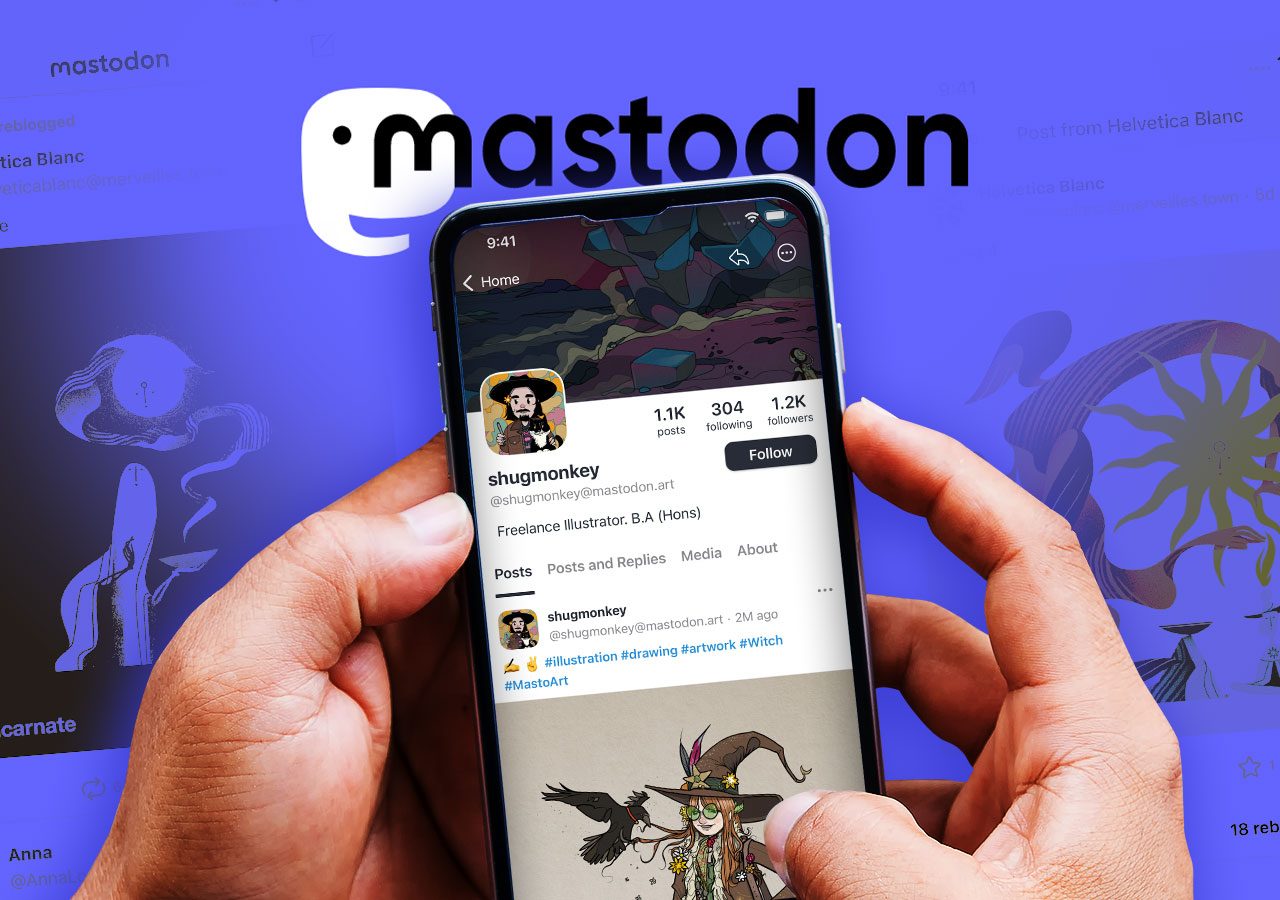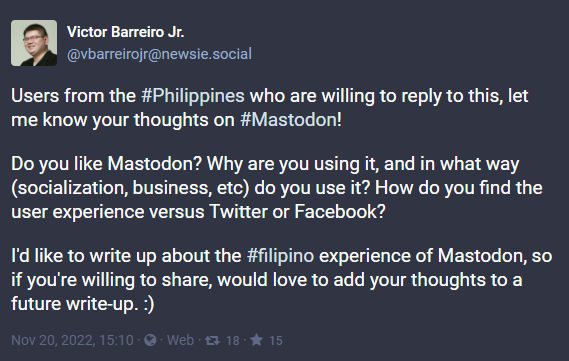SUMMARY
This is AI generated summarization, which may have errors. For context, always refer to the full article.

MANILA, Philippines – For those worrying about the direction (or potential end) of Twitter, the idea of jumping ship to a new platform like Mastodon may seem daunting. I felt that too, at first, but it took me about a day to get used to the differences between Twitter and Mastodon.
It took slightly longer to grasp some of the nuances that make the two different.
To that end, let’s discuss how to get started on Mastodon, what you should expect it to be and what it isn’t, and what some Filipino users who started using Mastodon have said about the service.
What is Mastodon?
Founded in 2016 by German software developer Eugen Rochko, Mastodon is a non-profit type of software that lets individuals set up servers (or “instances”) that can allow users to communicate with each other.
Users of Mastodon are part of the “Fediverse,” or an interconnected set of social media services, through the software. While social media users can see Twitter as one social media service among many, Mastodon is the equivalent of WordPress, which is used to create blogs and other sorts of websites as part of a greater whole.
The Mastodon many people know about, however, is the microblogging aspect of it that’s akin to Twitter, so we’ll stick to that for now.
How do I set up an account?
One of the main stumbling blocks of Mastodon is that it feels daunting to get started, so let’s simplify the process.
Mastodon has approximately over 7,700 instances you can join, with most being interest-based. To make it easier to choose from the over 7,000 Mastodon instances one can join, users can visit JoinMastodon.org and look through their list of servers which agree to a covenant following particular standards of conduct.
Pick a server, fill out a form requesting a display name, your username, email address, and password, and either get automatically accepted or go through some additional processes to get yourself accepted into a given instance.
Yes, some instances – the newsie.social instance I’m on, in my case – manually review applicants so they can be added to the instance. Once you’re in a given instance, you can set up your profile as you please.
If you don’t feel like the instance is a good fit for you, you can migrate to a new instance relatively quickly.
Mastodon isn’t Twitter, redux
If “following algorithmic prompts” defines how you go about your day on Twitter, then Mastodon will take some getting used to.
Mastodon requires some active curation to find people you want to interact with and to find stuff you actually want to see. When you join a given instance, you start off with a Local page, where you see other people’s posts on your instance.
If you want to see a personal timeline of people you want to read on Mastodon, you’re going to have to work on it, either by searching for specific individuals on connected servers to follow, or by making an introductory post on your instance with hashtags denoting your interests.
For instance, my introductory post on newsie.social looks like this.

In other words, you may follow people after searching for or ticking on a hashtag and finding profiles of people who share your interests, or people may follow you if your introductory post’s hashtags (or the hashtags in your Mastodon profile) fit their interests.
Some additional notes for Twitter refugees, though!
Favorites are not technically equivalent to Twitter hearts or Facebook likes, as it only really just says a person likes what you posted, and doesn’t ascribe any further value to your post to any algorithms.
Meanwhile, boosting a post is not equivalent to retweeting, since mentally, your boosts are more of an endorsement that you’ve read something interesting and want to share it with your fellows. You also can’t quote-retweet, so a boosted post should stand on its own – and it’s more likely to represent something you agree with than not at all.
On Mastodon ‘defederation’ and security concerns
Those using Mastodon to socialize and interact with others online must also note that there is no central server for all of this. One thing Twitter users should get used to is that while Mastodon servers can be a welcoming place, each server is run by a person or a small team that makes their own rules and policies on conduct. Read the policy on the server you’ve joined to make sure your values and the values of the instance you’re in align, or you could see yourself in some of the following scenarios.
The first scenario is simple enough: you could get booted off a server for misbehaving on it or saying something against their code of conduct. Being anti-trans on a server explicitly supporting trans rights, for example, will likely force you to learn how to migrate to a new server.
The second scenario is with regard to “defederation.” Defederation is a Mastodon-specific term wherein one server’s connections to other servers in the fediverse are blocked because the interests of that one server do not align with others. For instance, if there was an Mastodon instance supporting bigotry or hatred in some form, and you joined it, you should not expect to see other Mastodon instances with codes of conduct or server administrators that do not support such views.
Lastly, one security concern that Mastodon users should note is to never use Direct Messages here for sensitive private communications. Privacy and information security lawyer Whitney Merrill noted there is no end-to-end encryption on Mastodon servers, so unless you know the one managing your server is a stand-up fellow, there’s a possibility that a server administrator could read your private messages. Of course, this caveat might also applicable to things like Twitter DMs, but it needs to be said regardless.
How are Filipinos finding Mastodon?

An informal post I made asking Filipinos for their thoughts on Mastodon saw a number of responses, with some noting the initial onboarding experience could use some work, but otherwise found Mastodon was “a delight” in general.
Most of the users who responded to my callout were interested in socialization or sharing their thoughts in a safe space.
To that end, Mastodon user Joan said, “Mastodon gives you more freedom to choose how you engage in a social networking space. You want breadth? Go to your local/instance and federated timelines. You want depth? Engage your followers and following.”
She added, “It’s similar to an actual physical social space where you ‘need’ to really do socializing to be able to meet people, find common interests, and have meaningful conversations.”
Meanwhile another user, Migs, said, “In comparison to Twitter or Facebook, there’s less rage inducing content, you can actively choose whether to engage or not. Likewise the communities are inclusive in that it includes things like ‘cw’ content warnings & pic descriptions.”
He also said that compared to Twitter or Facebook, Mastodon “feels a lot less toxic… and the result is that I ended up ignoring my accounts on those two at first, but then I eventually just deactivated them.”
One other positive thing I and some of the replies to my post noticed was a fun sense of discovery. Mastodon user Cupcake told me that she expected her access to be severely limiting, but instead she found new things to see organically. She wrote, “There’s the federated timeline + the boosts from people I follow lets me discover posts and, ultimately, people from other servers. I ended up following people from many other servers without conscious effort!”
Lastly, one thing some Filipino users noticed was missing was Philippine newsgroups and journalists in the federated space.
User Jiko wrote, “I want to use #Mastodon to read about #PhNews, #PhSports and #PhStocks #Languages like in Twitter. Not much of those yet but I’m staying. I like the idea that there are many servers so there is no central control, and there are no ads.”
Meanwhile, Mark said he was “hoping companies or journalists can set up their own instances to encourage more #Filipino (s) in joining Mastodon. And don’t forget to tip your server admin (appreciated but not required)!” – Rappler.com
Add a comment
How does this make you feel?
There are no comments yet. Add your comment to start the conversation.